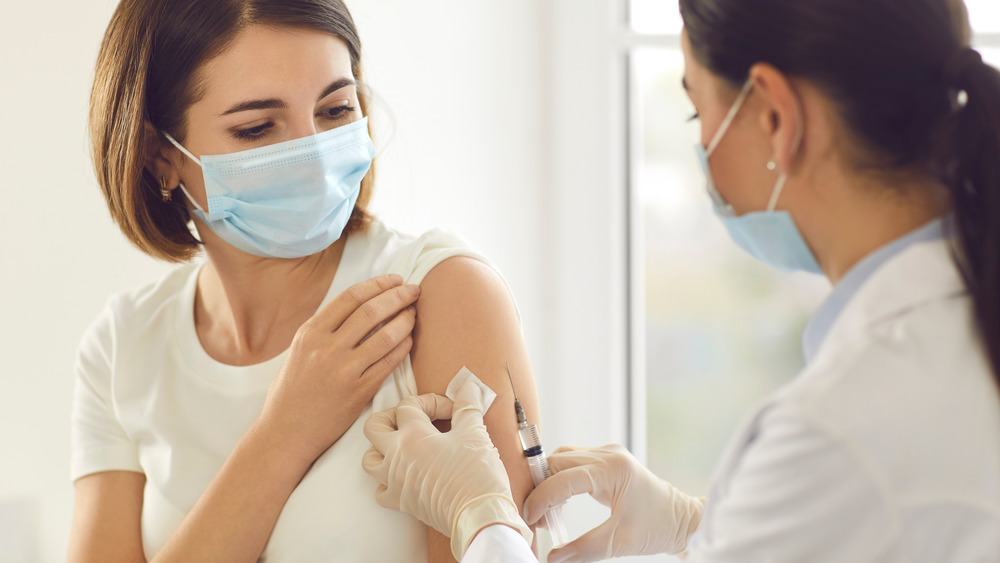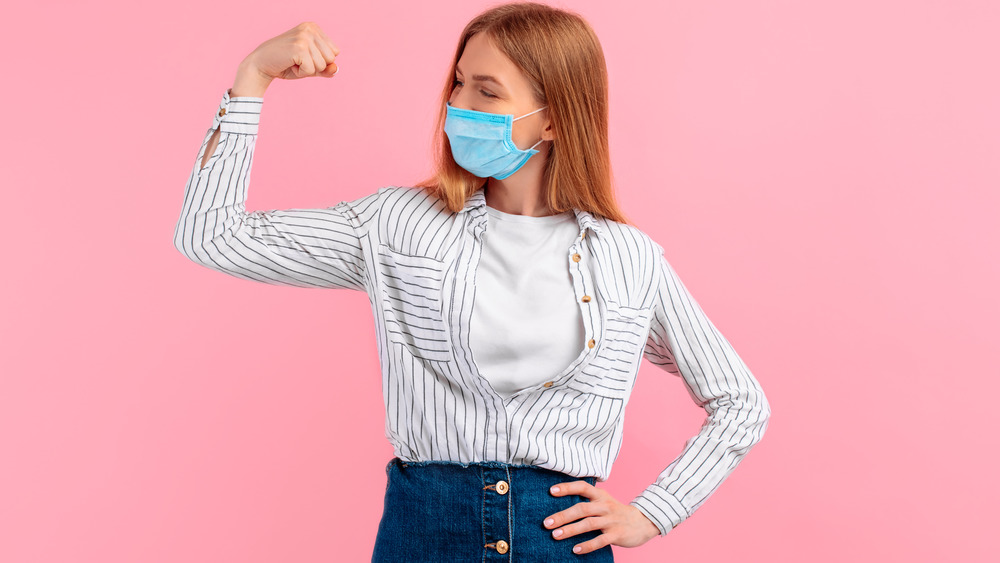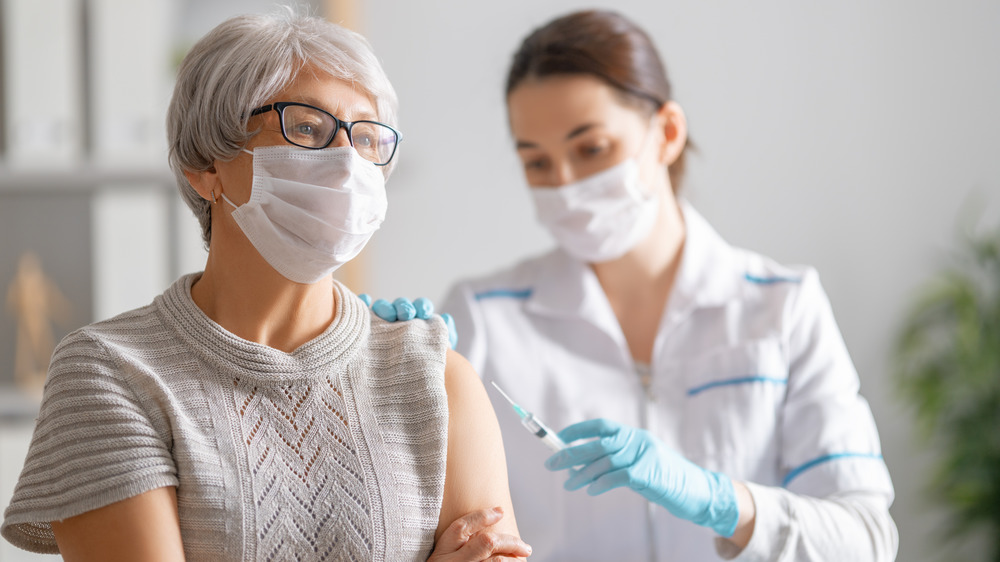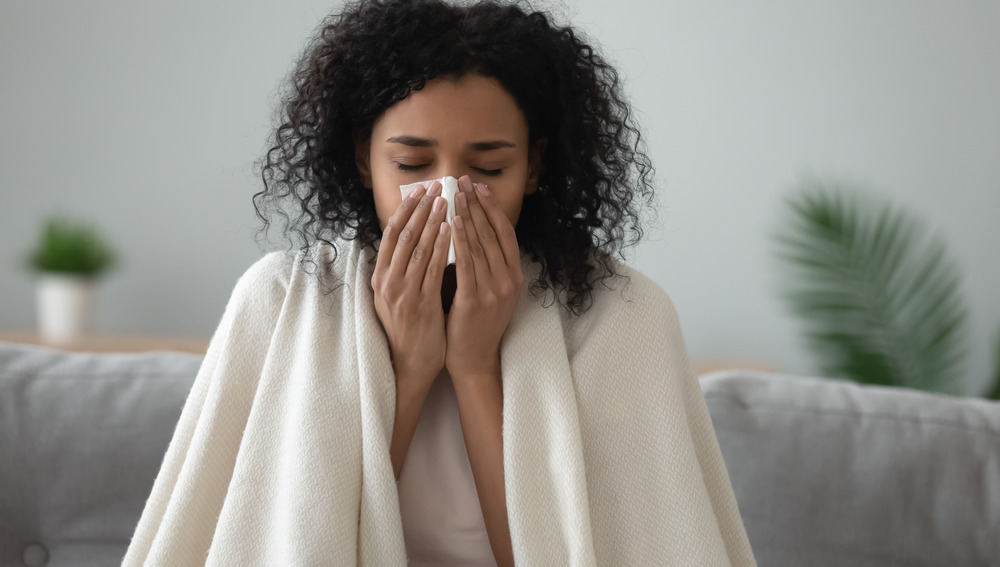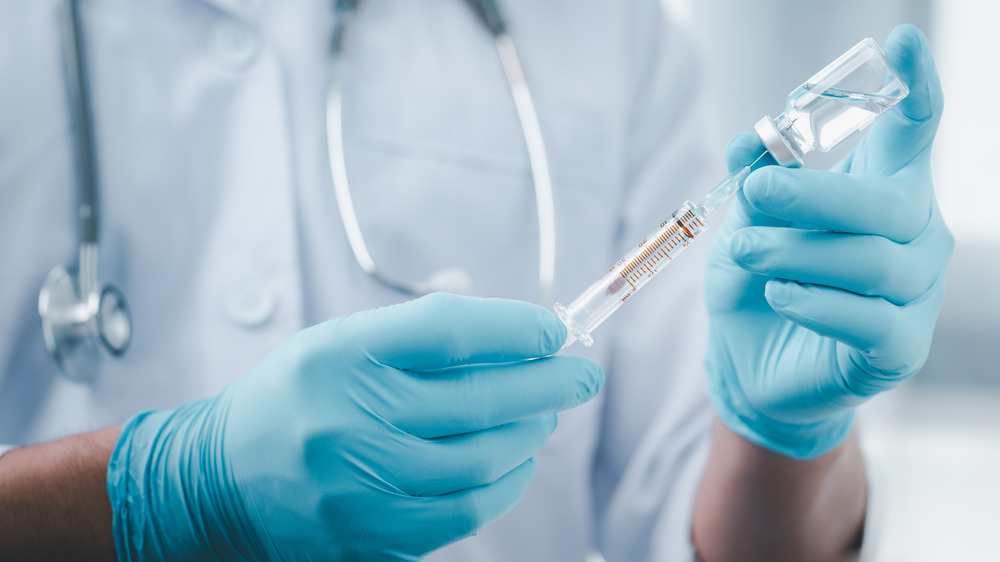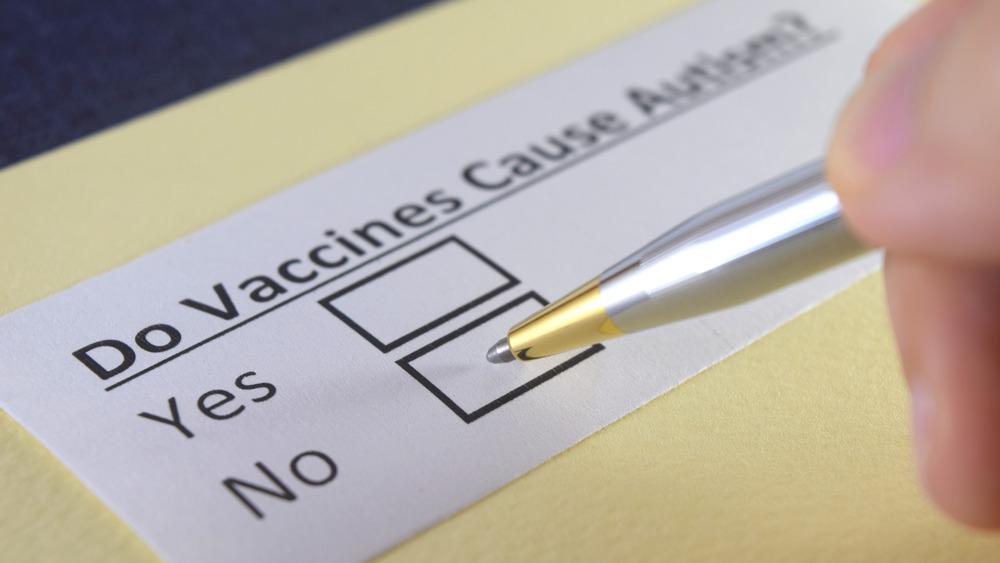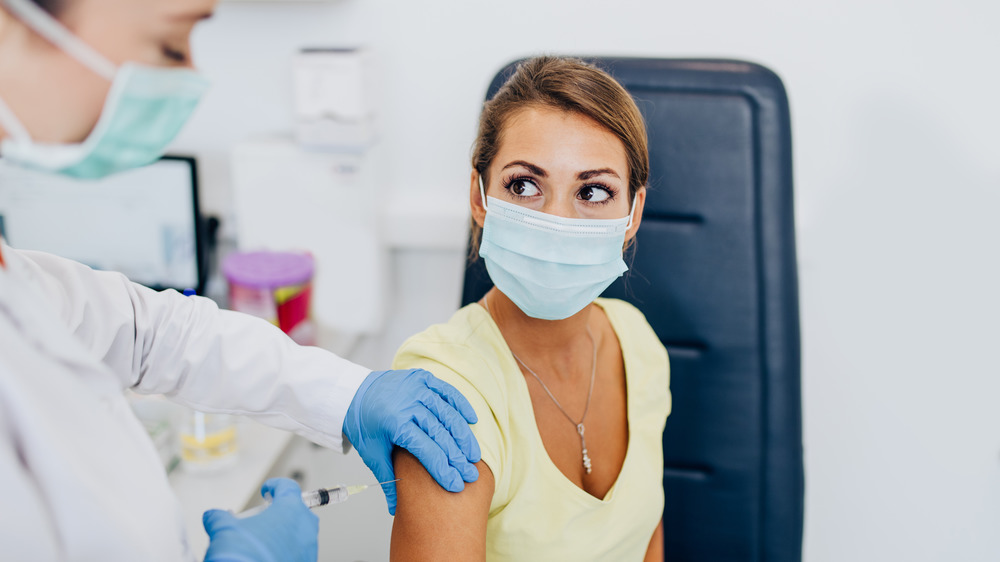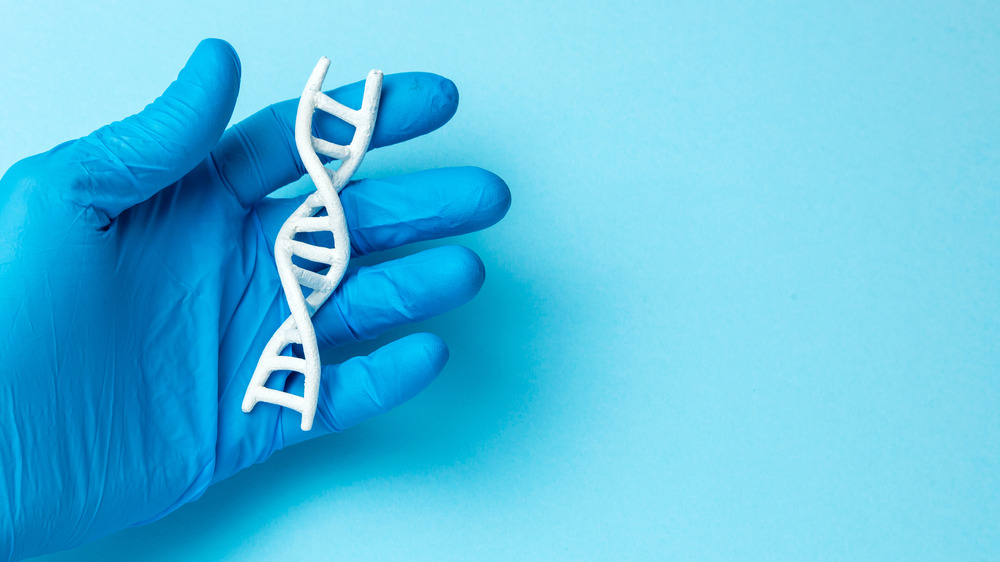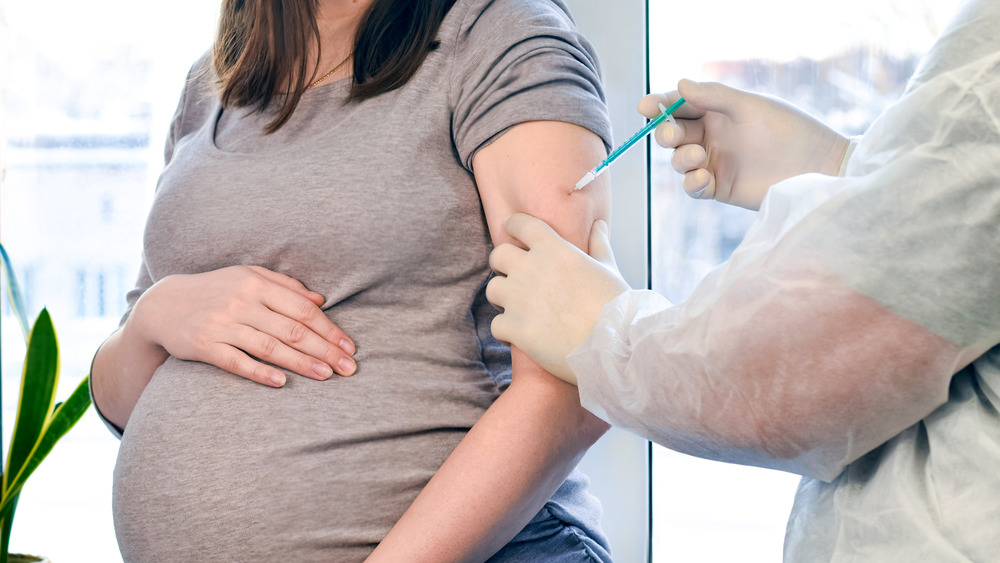What Really Happens To Your Body When You Get Vaccinated
As we live in a world of germs, vaccinations are important. Of course, some germs, like gut bacteria, are actually helpful, but plenty of others are harmful. Viruses that enter the body can cause severe diseases, such as smallpox and malaria. One virus called the H1N1 virus devastated the early 20th century as it erupted into the influenza pandemic and claimed at least 50 million lives worldwide, according to the CDC.
Luckily, as viruses have evolved, so has modern medicine. Vaccinations have played an important role in saving human lives and preventing the spread of many deadly diseases. The World Health Organization reports childhood immunization prevents 2 to 3 million deaths a year and could prevent an additional 1.5 million deaths if global vaccination continues to expand.
As the world grapples with another pandemic, it's important to remember that vaccines save lives, and side effects from vaccinations are temporary. Here are the facts you need to know about the ways vaccines affect the body.
Vaccines train your immune system
Inactivated vaccines such as the polio and flu shot use dead viruses from the disease to alert the immune system of a foreign invader in the body, the U.S. Department of Health & Human Services (HHS) explained. However, dead viruses are less effective in training your immune system, so you might need booster shots for ongoing immunity.
Live-attenuated vaccines often provide better protection because the virus is, well, live — though in a highly weakened form. The HHS says live-attenuated vaccines appear similar to the natural infection they're preventing, which helps with robust training of your immune system. For this reason, the MMR vaccine and chickenpox vaccine only need one or two doses to provide lifelong immunity.
Another type of vaccine is the mRNA vaccine, like the Pfizer and Moderna COVID-19 vaccines. NYU Langone Health explains that mRNA vaccines do not use a virus to prime the immune system. Instead, it sends over mRNA from the virus that is used to make the spike protein, which the immune system will be able to look for in future coronaviruses that enter the body. Note: You cannot catch the virus or disease you're being vaccinated against no matter which form of vaccination you are receiving.
After receiving a vaccine, your immune system levels up in its ability to fight viruses
Vaccines work because they mimic an infection. The Centers for Disease Control and Prevention says this training simulation helps white blood cells recognize and destroys a virus. The battle takes a few days since the immune system takes time to identify the threat and prepare the troops to fight. But after its victory, cells called T-lymphocytes record the fateful encounter into memory.
Immunity occurs because the vaccine trains the immune system to stay on high alert. As if there's a "Most Wanted" poster of the virus, the immune system learns to quickly recognize and attack any suspicious pathogens that look like the virus or viruses that look similar.
Some people develop lasting immunity if they've been infected, but vaccines are better because you're not risking long-term health complications such as pneumonia, cancer, or death, according to the Children's Hospital of Philadelphia (CHOP). With vaccines, scientists determine the smallest amount of virus needed for an immune response. CHOP also revealed that some vaccines, such as the HPV vaccine and the tetanus vaccine, are more protective than natural infection.
Vaccines protect against viruses for varying amounts of time
Smallpox is the only human disease in history entirely eliminated by vaccination, according to the World Health Organization. The "routine smallpox vaccination among the American public stopped in 1972" since it was no longer necessary. When it was given, the smallpox vaccine protected individuals for three to five years, with additional booster shots available to enhance immunity further (via Centers for Disease Control & Prevention). It's for this reason children are vaccinated so early in life. "The diseases these vaccines prevent are most deadly in the very young," Kenneth Boyer, a pediatric infectious disease specialist, told Rush University Medical Center.
While the world won the battle against the deadly smallpox virus, it went to war again in 2020 — this time with the novel coronavirus, or COVID-19. The vaccines developed for COVID-19 have shown to be highly effective in preventing severe infection and hospitalization. However, data collection on how long vaccine-induced immunity will last is still ongoing. "[It] is very likely that for [the] COVID-19 vaccine, given that the length of immunity the vaccine generates is limited, we may have to be vaccinated annually," Chunhuei Chi, the director of the Center for Global Health at Oregon State University's College of Public Health and Human Sciences, told Verywell Health.
You may start to feel feverish after receiving a vaccine
When the body is getting rid of a virus, it pulls out all the stops. According to the Children's Hospital of Philadelphia (CHOP), having a fever after vaccination is a good sign that our immune system is working overtime to eliminate the virus. Your body may intentionally make you feel feverish as to be an inhospitable environment for germs. With increased temperatures, germs are less likely to replicate and spread over the body (via Medline Plus).
CHOP further explained that vaccines are designed to trigger the immune system to act as if a virus is present. While vaccines use a limited amount of virus to avoid illness, an increasingly strong immune response could trigger symptoms like a mild fever. Fevers tend to happen within a week after vaccination — although this can vary.
Some vaccines, such as the mRNA COVID-19 vaccines produced by Pfizer and Moderna, require two doses, and a fever is more likely after the second dose. According to the Centers for Disease Control and Prevention, getting a fever after the COVID-19 vaccine is "normal" and a sign that "the body is building immunity."
Vaccines introduce small amounts of toxins in the body
If you look at an ingredient list for a vaccine, you might be startled to see formaldehyde, aluminum, and mercury. However, vaccines are purposely designed to allow only small amounts to enter the body, according to Rush University Medical Center. Given that vaccines undergo rigorous safety testing, you can be assured that these ingredients are not going to harm you. In fact, their presence helps to increase vaccine safety.
"They ensure that the vaccine is sterile, or that it's able to do its job effectively," Kenneth Boyer, a pediatric infectious disease specialist at Rush University Medical Group, told the medical center. "They are only toxic in amounts far higher than the trace amounts needed for vaccines."
While the inclusion of formaldehyde may have you scratching your head, Rush confirmed that this seemingly scary ingredient is actually "produced at higher rates by the body's own metabolic system." Yes, it's naturally occurring, and it will only present a problem in large quantities — far larger than you'd receive in any vaccine (via American Cancer Society).
No, vaccines do not cause autism
The misinformation regarding vaccines and autism stemmed from one study that was later retracted for providing unempirical evidence. "After the study was published, it came out that the main author had a financial incentive for the study to be published," Renee Slade, a pediatrician at the Rush Pediatric Primary Care Center, told Rush University Medical Center. "After more was learned about the study, the other authors removed their names. That study has also been debunked by many other studies that used larger groups of children." A 2013 study in The Journal of Pediatrics, for example, found no association between vaccines and autism.
According to the Centers for Disease Control and Prevention (CDC), there is also no link between a vaccine ingredient called thimerosal and autism. Nevertheless, thimerosal was removed or drastically reduced in all vaccines aside from the flu vaccine as an extra precaution. Thimerosal-free alternatives to the flu shot are also available, according to the CDC.
While the autism-vaccine link has been debunked in the medical world, there are still believers, which fuels the risk for vaccine hesitancy and anti-vaccination groups. Sadly, a January 2020 study in the journal Vaccine found 16.5 percent of caretakers believe childhood immunizations could develop into autism.
You could develop a headache after getting vaccinated
Your immune system is kicked into overdrive after vaccination and could respond with a less-than-lovely headache. A 2016 study from Neurology found headaches were a common side effect after receiving various vaccines, especially the flu shot and the hepatitis B vaccine.
Younger people are likely to experience more side effects, including headache, from the COVID-19 vaccines. "The immune response is more robust if you're young and healthy," Wilbur Chen, a professor of medicine at the University of Maryland School of Medicine, told AARP. "I've seen health care workers in their 20s and 30s who think they're bulletproof be surprised by their response to the vaccine. I'm aware of these reactions because I have to go into lengthy counseling about these reactions." AARP also reported that side effects (like headaches) are more likely to occur after the second COVID-19 dose.
You shouldn't try to avoid a potential headache though. According to Healthline, there's not enough data to know whether taking aspirin or ibuprofen before vaccination will impact your body's immune response. That said, the Centers for Disease Control and Prevention says it is safe to take over-the-counter medications such as acetaminophen after vaccination.
After getting a vaccine, you may experience pain around the injection site
What doesn't kill you makes you stronger, right? Kelly Clarkson may not have been talking about arm pain when she sang that hit song, but it certainly applies to vaccinations. After receiving a flu shot, for example, your body begins to develop antibodies in response to the "dead" virus that is deployed from the vaccine, according to the American Lung Association. Arm soreness can result from the immune system acting in response to this foreign invader. In addition to soreness, arm swelling and redness are common and can appear 24 to 48 hours after vaccination.
You may also experience injection site soreness after receiving the COVID-19 vaccine. However, you can choose to treat your pain with ibuprofen after getting vaccinated or rely on homeopathic treatments. "If it's really sore or if you have general body aches, just take 2 cups of Epsom salt, put it in some relatively warm water and soak in there for 20 minutes, finish with a cold shower and get into bed," Michael Daignault, an emergency physician, advised when speaking with USA Today. Choose your non-dominant arm for your vaccine, and ice the area afterwards, Dr. Juanita Mora, allergist and immunologist, recommended when speaking with the American Lung Association.
You're unlikely to get Bell's palsy after this vaccine
According to an FDA report, four of 30,000 participants in the Moderna vaccine clinical trial developed Bell's Palsy, a neurological condition causing facial paralysis. Three participants were in the vaccine group, while one was in the placebo group. In the Pfizer clinical trial, 4 of 43,000 participants developed Bell's palsy — all in the vaccine group. However, staff from both companies said there was no evidence that the vaccine caused Bell's palsy (via WebMD).
"The information we have is insufficient to say that there is a causal relationship between Bell's palsy and the vaccine. If we look at the incidence of Bell's palsy among both Moderna's and Pfizer's participants, the number is, as the FDA mentioned, 'consistent with the expected background rate in the general population.' It is too early to say if Bell's palsy is related to the [vaccine]," Irene Kim, an assistant professor of Head and Neck Surgery and director of the Facial Nerve Center in the Division of Facial Plastic Surgery at UCLA told Forbes in December 2020. Nevertheless, a February 2021 article in The Lancet reported it was highly unlikely for someone to get Bell's palsy after receiving the COVID-19 vaccine.
Fainting is a possible side effect of vaccines
Some people experience fainting after being immunized. According to the Centers for Disease Control and Prevention (CDC), fainting is most commonly reported among adolescents administered the HPV, MCV4, and Tdap vaccine. A CDC Morbidity and Mortality Weekly Report found 11- to 18-year-old girls reported more instances of fainting after vaccination. Most fainting episodes occurred within 15 minutes of being administered the shot.
Given that the ingredients widely vary across these vaccines, the CDC suggests fainting is not a direct result of the vaccine, but other factors like anticipation of pain or anxiety. To prevent fainting, the CDC recommends healthcare workers monitor a patient for up to 15 minutes to observe any immediate side effects. The Immunization Action Coalition revealed that dizziness, weakness, sweatiness, and paleness are symptoms of a potential fainting spell. Patients should also eat a snack or drink a beverage.
Very few people are allergic to vaccines
An uncommon side effect of vaccination is an allergic reaction. A January 2021 study in JAMA reported a small group of people reported severe allergic reactions after being administered the first dose of the Pfizer-BioNTech COVID-19 vaccine. The Centers for Disease Control and Prevention (CDC) explains this is rare, and people are more likely to experience pain at the injection site, fever, nausea, and headaches.
According to another article from the CDC, people with egg allergies have a rare chance for severe side effects following a flu shot. The chances of this occurring are 1.31 per million vaccine doses administered. The CDC continues to recommend administering flu doses to people with egg allergies, but such ones should be monitored by a health care provider.
Guillain-Barré Syndrome is another severe concern as it causes the immune system to attack your nerves. However, the CDC says this is also very rare, with one to two cases per million flu vaccine doses given. "You are more likely to get [Guillain-Barré syndrome] from the flu itself rather than the vaccination," Ryan Steele, an allergist-immunologist and internist at Yale Medicine, confirmed when speaking with Insider.
Vaccines do not change your DNA
A concern some have about mRNA vaccines — like the COVID-19 vaccines produced by pharmaceutical companies Pfizer-BioNTech and Moderna — is that they can change your cellular DNA. However, these claims are unfounded, as mRNA vaccines' design makes it impossible for a virus to infiltrate and cause genetic changes.
Like a Snapchat message, once the body sees the mRNA piece, it quickly disappears. Nebraska Medicine says this is because the viral mRNA is fragile and degrades quite quickly, which is why mRNA vaccines have to be stored at very low temperatures.
Given how quickly mRNA gets destroyed, there is no chance for it to infiltrate into the cell. "It's basically a piece of material that contains instructions," Bryn Boslett, an infectious disease expert at the University of California San Francisco, explained. "Once it's injected, it's taken up by your cells, but it never enters the cell nucleus where all of your DNA exists within your cells."
Vaccines don't cause infertility
A popular misconception surrounding vaccines is that they can somehow cause infertility or miscarriages. However, the Mayo Clinic Health System says there's no evidence of vaccination-inducing immunity causing infertility. Many concerns revolve around the HPV vaccine, which the Centers for Disease Control and Prevention also says has no link to reproductive issues. While there's been no official study looking at COVID-19 vaccine effects in pregnant women, the Mayo Clinic Health System says linking infertility or miscarriages to the vaccine is unfounded. The infertility rumor stemmed from a popular anti-vaxxer and lacked credible evidence.
"The rumors are based on the fear that messenger RNA in the vaccine could cause infertility by accidentally attacking a protein in the placenta called syncytin-1, which has a (sort of) similar structure to the coronavirus spike protein. However, these are totally different structures and there is no reason to think this would happen," Jennifer Conti, OB-GYN and medical adviser for Modern Fertility, told Healthline.
Vaccines help keep babies safe during pregnancy
Vaccines aren't just for your health but for everyone around, and even any growing inside, you. According to Healthline, vaccines before and during pregnancy start giving the fetus immunity against severe disease. Additionally, infections such as rubella increase the risk for miscarriage and congenital disabilities. As Healthline explained, the Centers for Disease Control and Prevention (CDC) recommends women take the MMR vaccine before they get pregnant. Additionally, women should get the Tdap vaccine for whooping cough and the flu shot during pregnancy.
A 2017 study published in The Lancet Infectious Diseases found flu shots safe and beneficial for both mother and child. The researchers found immunized pregnant women had a lower risk of the flu, babies had a 15 percent risk reduction for low birth weights, and a 30 percent decreased risk of infants getting the flu.
The CDC also recommends pregnant women or women who are breastfeeding consider taking the COVID-19 vaccine. Pregnant women are at high risk for severe infection, hospitalization, requiring respiratory support, and death. While there is limited data on safety during pregnancy, vaccination in general protects pregnant women, and there is no risk of contracting the virus through a COVID-19 vaccine.

